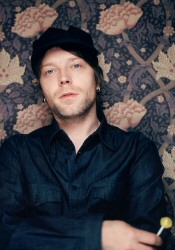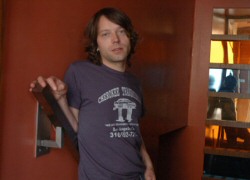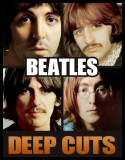
Interview with Magnet
04/01/2006
Music Home / Entertainment Channel / Bullz-Eye Home
Even Johansen, a.k.a. Magnet, is back with his first album on the Atlantic-distributed Filter U.S., The Tourniquet. A native of Norway, Magnet is on tour to support the new record in North America for five weeks and recently stopped to chat with Bullz-Eye.com about the record, touring, healing tattoos, life in Norway and how he is dealing with lofty comparisons.
Bullz-Eye: First of all, I love the new record. How is the media receiving it in general here in the States?
Magnet: So far it’s been strange. I think I’ve been lucky with the way that I have been received in the places we’ve gone and stuff. I suppose I’ve been spoiled with all the good press. I suppose – and everyone pretends it doesn’t mean anything, whether good or bad, and I’m one of them too – but I much prefer good reviews than bad reviews.
BE: I don’t blame you.
M: So it’s been really good. It’s been a bit surprising that it’s been that well.
BE: That’s good. How about in Norway?
M: In Norway it’s kind of turned into the credible part of music that’s allowed to be liked for mainstream people, if you know what I mean. I’m much more established in Norway than here.
BE: So they don’t go crazy over your new stuff?
M: Well, the reviews have all been really good. I don’t know. It’s difficult to brag about yourself and I’m not very good about that. But the reviews have always been really good. I’ve been lucky that way.
BE: That’s good. So how was it exactly that a label discovered you?
M: Well eventually…it’s kind of a strange story. A friend of mine I’ve known for a long time ended up being my manager for some reason. I don’t know why on earth anyone decides to be a manager. Anyway, he was in Norway with some other band and he heard some music that a friend of mine played for him, and he was like, “Wow, can I work with you?” And I’m like, “Yeah, sure.” So that’s kind of how that happened. Then he went back and he has just started to work with Franz Ferdinand and all these other bands that are doing so well. So he was kind of like the ‘golden boy’ there for a bit.
BE: Cool. What was the name of the manager?
M: He’s called James Sandom.
BE: Is he still managing you now?
M: Yes. The management company is called Supervision Management. And they’re doing really well with everything they’re working. It was not any of my assets, let’s put it that way, which is the good way to have it. You know, I can make music and they can make the deals.
BE: So I read about the tattoo that essentially saved your life (Johansen suffered from anemia as a child and was cured by an alternative medicine dude who gave him a tattoo). I assume this is something that really happened and not a PR stunt, right?
M: Yeah, I’ve never been one for PR stunts. I only try to be myself. I find that much easier for me.
BE: And you’ve been okay ever since then?
M: Well, I’ve never been anemic since then. To tell you that I’m okay is pulling it a bit far.
BE: Did having songs on “The O.C.” and “Six Feet Under” help you to get recognized here or were you already on your way to being recognized at that point?
M: You know, I think that kind of stuff really helps. It helps on a different kind of level, I think. How much of an impact it has for the viewers, I’m not too sure. But it makes you very visible in the music business. And that kind of helps – people talk and then more people talk. And if there was any way to try and get attention, I think that’s probably one of the best ways to do it. Because it’s not the kind of hype-y attention. So I really enjoy that. An inflatable mattress is really good until it pops, you know, and then it’s no good anymore. So I would rather be on a bit more solid ground then the hype-y kind of ground. But I think it’s a really good way to get some notice.
BE: Did you notice a big spike in record sales after that?
M: No, that’s what I mean. It doesn’t. All the records I have released, and everywhere I’ve released them, it has actually taken a bit longer. And I really appreciate that. So people kind of have of a relationship with the songs rather then the hype. And I much prefer it that way. So there is always some bit of a jump when something like that happens, but it’s not an instant platinum record, let’s put it that way.
BE: What do you think is different about The Tourniquet compared to previous music you have released?
M: I think the initial sort of idea when I started recording The Tourniquet was to try and make the music a bit more personalized. The lyrics are a bit more in the first person, rather then telling story about something that has happened to somebody else, even though that might have happened to me. So to me it’s kind of more direct and it gets a bit quicker to the point. I listen to the record and it is a bit more immediate than the previous outings.
BE: And would you say it’s easier to write that way?
M: No, well actually, it’s such a different kind of way of writing. I don’t think it’s more difficult, it’s just different.
 BE: That makes sense. And are you on tour right now?
BE: That makes sense. And are you on tour right now?
M: Yeah, we came over to the US maybe two weeks ago. So we did some shows with a Canadian band, Stars, on the east coast. And we went to Canada for about a week and a half before we came down to L.A. So we’re kind of in the middle of a five-week outing.
BE: You’re going to be at South by Southwest?
M: Yeah, I’m really looking forward to South by Southwest.
BE: Is this your first time?
M: No, I went there with a band I used to be in, a long time ago, like in ’99 or 2000. And the heat and everything…me being Norwegian…boy in March, that’s really nice.
BE: (Laughs). Right!
M: So I’m looking forward to the heat and the whole thing. If you can’t be entertained at South by Southwest, then you should find something else to do. So yeah, I’m looking forward to it.
BE: Do you travel with a band, or are you basically the band when you’re on the road?
M: Well, that kind of changes as well. I don’t know if it’s a blessing or a curse. I find that things get quickly stale. So if you’re traveling with a band and you play the same songs the same way all the time, I kind of lose the inspiration a bit, if you know what I mean. So half of the shows that we’ve done so far have been with a band, and half of them I do by myself. And the sound engineer that I bring with me plays some instruments, and he plays around with the stuff that I make. So some of the stuff is solo. I would say 50/50.
BE: A friend of mine saw you on New York a couple of years ago and said you played by yourself, and you played a bunch of different things by yourself, and it was really cool.
M: Oh, excellent. Yeah, I have this lap steel guitar.
BE: Right! That’s what he said. Exactly.
M: And that kind of lends itself really well to it. You have all these mishaps and stuff, and you realize the guitar can actually become the band in a way. I can make drum beats and stuff like that on the guitar. So it kind of gets a bit more inspiring for me to do rather than just being a troubadour, if you like.
BE: Right. Or just a front man for a band.
M: Yeah. So I really quite enjoy the fact that it turns into something else. It’s cool.
BE: Are there usually any surprises in your set? Do you play any obscure cover songs?
M: Well, it varies. Sometimes I do. I don’t usually write down set lists and stuff like that. I think it’s much more fun when you play live shows to try and connect in some way with the audience. It’s not necessary that you have to force whatever it is that you want to portray on the audience. It’s much nicer in a way to have a bit more participation from the audience. You kind of feel more of what you’re going to play. It changes all the time.
BE: What about cover songs? Do you play anything really cool?
M: Yeah. On the first record that came out, which was not really a record, I did a cover song of “Dancing in the Moonlight.” And I’ve done some strange stuff. I did a Christmas song, “Let it Snow.” So yeah, stuff kind of pops up, depending on the mood.
BE: And you’ve been compared to the likes of the Beatles and the Beach Boys as far as melodies. How do you feel about those expectations? Are they high expectations to live up to?
M: You know, I think on the sort of expectations or “how am I going to be perceived” I don’t really give a fuck, to tell you the truth. It’s like, the only thing I suppose I am trying to do is impress myself. If I’m able to play my songs to the best of my abilities then that’s the best I can do. So if that works, then good. If it doesn’t work, it doesn’t work, and that’s a shame. But I certainly would never dream of rubbing shoulders with that kind of artist. That’s not how I see myself. But it’s extremely flattering, of course.
BE: Of course!
M: It’s not something like I think, “Hey, I’m John Lennon.” Yeah, I wouldn’t go there.
BE: Who are your influences as a songwriter?
M: I think that basically the stuff that you listen to when you are a kid kind of stays with you for longer, so you’re more influenced by that. When I was a kid, the first record I bought was Rastaman Vibration by Bob Marley and the Wailers. And you know when I was that young, you could only afford to get one record a month. So you kind of play it to death, if you know what I mean. So that kind of stuff stays with you. And nowadays when I can afford maybe a record a week or so, I don’t listen to it for that much. I would say my influences have been like Bob Marley, Leonard Cohen with the stuff my mom and dad were listening to. And I’ve had my fair share of listening to the Beatles and the Beach Boys as well, due to my parents. And then punky stuff. – I love The Clash, those kinds of things more than the newer stuff. I suppose you get influenced by newer stuff as well, but you just don’t know it.
BE: Definitely. Are you listening to anyone now in particular?
M: Well, you know, I forgot my iPod.
BE: Oh, that sucks.
M: You have no idea. I really enjoyed the last Sigur Ros album. I thought that was a wonderful record. And Royksopps’ new album, I really like that one too. You don’t end up listening to so much stuff, unfortunately. There’s never enough time. But that’s the kind of stuff I’m listening to lately.
BE: OK, cool. If you could meet one musician, dead or alive, who would it be?
M: That’s a tough one. You know, I think…now that’s a really tough one. I think whoever, I don’t know their name, but whoever was writing all the really old Disney stuff. The guy who wrote “Zippity Doo Dah.” I’d really like to meet him. He either was totally crazy or he must have been an absolute genius. I’m kind of hoping the latter. But I would be happy to find out.
BE: (Laughs). That is a pretty catchy melody.
M: Oh, I love it, you know! (Laughs)
BE: Do you have any funny stories from the road at all?
M: Umm…(Laughs). Well, lots of stuff happens all the time. We nearly got arrested two weeks ago in New York because we were filming. We were in the cab and we’re driving through a tunnel and come out, and then it’s like “have you got your passports? We need to make sure you’re not terrorists.” That kind of stuff happens all the time.
BE: Were you filming a video?
M: No, no, no. Just the camcorder. We were just driving. I was like OK, I didn’t realize that wasn’t allowed in the states. But you know…
BE: I didn’t, either.
M: So, that kind of stuff happens.
BE: What are some other hobbies and interests you have besides music?
M: You know, it’s a sad, sad thing – and I think most musicians have it the same way – it IS kind of your hobby.
BE: Everything you do revolves around it, pretty much, right?
M: Yeah, especially if you write songs. It’s not something you switch on and off…unfortunately, sometimes. What I do like is, you know I live by the sea, so I like going out on my boat. That’s a cool thing to do for me. It relaxes me, and maybe that’s the one time I don’t think about music. So yeah, I go out on the boat.
BE: How long is your summer in Norway?
M: It’s pretty much the same as it is, I’d say, in Boston. Obviously we get longer days in the summer and shorter days in the winter. So everyone kind of boats in the summer time and then spends the next couple of months to kind of recoup.
BE: Yeah, that makes sense. Do you have any final thoughts or things you want to plug on Bullz-Eye.com?
M: No, you know the only thing I can say is that bull’s-eye is the message alert on my phone.
BE: Really? That’s interesting.
M: Yeah. Whether it’s yours, you know, it’s the sound of a bull’s-eye.
BE: (laughs). No, I don’t think it’s us, but…
M: Well, just pretend that it’s yours.
Send any questions or comments to mfarley@bullz-eye.com.








